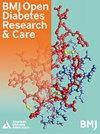Association between personality, lifestyle behaviors, and cardiovascular diseases in type 2 diabetes mellitus: a population-based cohort study of UK Biobank data
IF 3.7
2区 医学
Q2 ENDOCRINOLOGY & METABOLISM
引用次数: 0
Abstract
Introduction Various strategies aim to better assess risks and refine prevention for patients with type 2 diabetes mellitus (T2DM), who vary in cardiovascular disease (CVD) risk. However, the prognostic value of personality and its association with lifestyle factors remain elusive. Research design and methods We identified 8794 patients with T2DM from the UK Biobank database between 2006 and 2010 and followed them up until the end of 2021. We assessed personality traits using the Big Five proxies derived from UK Biobank data: sociability, warmth, diligence, curiosity, and nervousness. Healthy lifestyle behaviors were determined from information about obesity, smoking status, and physical activity. The primary outcome was a composite of incident CVD, including myocardial infarction (MI), ischemic stroke (IS), atrial fibrillation (AF), and heart failure (HF). Results During a median follow-up of 13.6 years, a total of 2110 patients experienced CVDs. Among personality traits, diligence was significantly associated with a reduced risk of primary and secondary outcomes. The adjusted HRs with 95% CIs were: composite CVD, 0.93 (0.89–0.97); MI 0.90 (0.82–1.00); IS 0.83 (0.74–0.94); AF 0.92 (0.85–0.98); HF 0.84 (0.76–0.91). Healthy lifestyle behaviors significantly reduced the risk of composite CVDs in groups with high and low diligence. The findings of a structural equation model showed that diligence directly affected the risk of the primary outcome or indirectly by modifying lifestyle behaviors. Conclusion This study revealed which personality traits can influence CVD risk during T2DM and how patients might benefit from adopting healthy lifestyle behaviors in relation to personality. Data are available upon reasonable request. The data used in the present research are available via a direct application to the UK Biobank (2 型糖尿病患者的性格、生活方式行为与心血管疾病之间的关系:基于英国生物数据库数据的人群队列研究
导言:2 型糖尿病(T2DM)患者的心血管疾病(CVD)风险各不相同,为了更好地评估患者的风险并完善其预防措施,我们采取了各种策略。然而,性格的预后价值及其与生活方式因素的关系仍然难以捉摸。研究设计和方法 我们从英国生物库数据库中确定了 2006 年至 2010 年期间的 8794 名 T2DM 患者,并对他们进行了跟踪调查,直至 2021 年底。我们使用从英国生物库数据中提取的五大代用指标来评估人格特质:交际能力、热情、勤奋、好奇和紧张。健康的生活方式行为是通过肥胖、吸烟状况和体育锻炼等信息确定的。主要结果是心血管疾病(包括心肌梗死、缺血性中风、心房颤动和心力衰竭)的综合指数。结果 在中位 13.6 年的随访期间,共有 2110 名患者发生了心血管疾病。在人格特质中,勤奋与主要和次要结局风险的降低有显著相关性。调整后的HRs(95% CIs)为:综合心血管疾病0.93(0.89-0.97);心肌梗死0.90(0.82-1.00);IS 0.83(0.74-0.94);房颤0.92(0.85-0.98);高血压0.84(0.76-0.91)。在勤奋程度高和勤奋程度低的人群中,健康生活方式行为可明显降低复合心血管疾病的风险。结构方程模型的结果表明,勤奋程度直接影响主要结果的风险,或通过改变生活方式行为间接影响主要结果的风险。结论 本研究揭示了哪些性格特征会影响 T2DM 患者的心血管疾病风险,以及患者如何从与性格相关的健康生活方式行为中获益。如有合理要求,可提供相关数据。本研究中使用的数据可通过向英国生物库(UK Biobank)直接申请获得,本研究是在获得批准后访问英国生物库数据进行的,申请编号为 91312。支持研究结果的所有其他数据可在文章及其补充信息文件中获取,也可向相应作者索取。
本文章由计算机程序翻译,如有差异,请以英文原文为准。
求助全文
约1分钟内获得全文
求助全文
来源期刊

BMJ Open Diabetes Research & Care
Medicine-Endocrinology, Diabetes and Metabolism
CiteScore
9.30
自引率
2.40%
发文量
123
审稿时长
18 weeks
期刊介绍:
BMJ Open Diabetes Research & Care is an open access journal committed to publishing high-quality, basic and clinical research articles regarding type 1 and type 2 diabetes, and associated complications. Only original content will be accepted, and submissions are subject to rigorous peer review to ensure the publication of
high-quality — and evidence-based — original research articles.
 求助内容:
求助内容: 应助结果提醒方式:
应助结果提醒方式:


